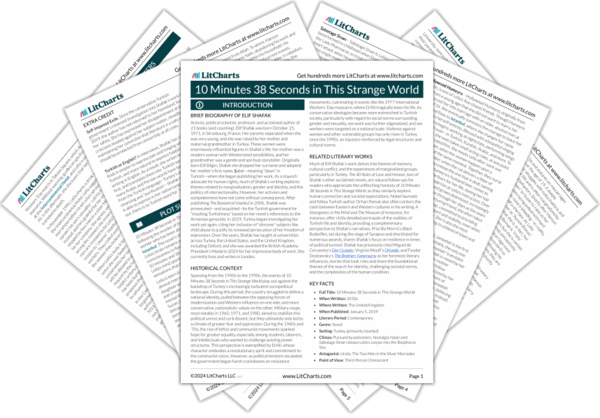Haroun/Baba Quotes in 10 Minutes 38 Seconds in This Strange World
Auntie glanced out of the window, intimidated by the world far and beyond. It was one of the endless troubles of her life that, even after all this time, and even after she had had two children, her fear of being kicked out of this house had not abated in the slightest. She still did not feel secure.

Unlock explanations and citation info for this and every other 10 Minutes 38 Seconds in This Strange World quote.
Plus so much more...
Get LitCharts A+“What about people in Canada or Korea or France?” Leila asked.
“What about them?”
“Well, you know . . . they are not Muslim, generally. What happens to them after they die? I mean, the angels can’t ask them to recite our prayers.”
Baba said, “Why not? Everyone gets the same questions.”
“But those people in other countries can’t recite the Qur’an, can they?”
“Exactly. Anyone who is not a proper Muslim will fail the angels’ exam. Straight to hell. That’s why we must spread Allah’s message to as many people as possible. That’s how we’ll save their souls.”
Baba never hit Leila. Neither before nor after. Though a man of several shortcomings, he never displayed physical aggression or uncontrolled wrath. So for bringing this impulse out in him, for rousing something so dark, so alien to his character, he would always hold her responsible.
She, too, blamed herself and would continue to do so for years to come.
Like a trapped butterfly, thought Leila. That’s what her brother had been in their midst. She feared they had all let this beautiful child down, one by one, including herself, mostly herself.
“My shiekh says Allah will curse you and I will live to see the day. That will be my compensation.”
There were drops of condensation on the window. She touched one gently with her fingertip, held it for a second, and then let go, watching it roll down. A pain throbbed somewhere inside her body, in a place she was unable to locate.
“Don’t phone us again,” he said. “If you do, we’ll tell the operator we are not accepting the call. We don’t have a daughter called Leyla. Leyla Afife Kamile: you don’t deserve those names.”
Her gut warned her that there was more to him than the considerate, gentle young man she saw and she had to be very careful. But her heart pushed her forward—just like it had done when, as a newborn baby, she had lain motionless under a blanket of salt.
Religion had always been a source of hope, resilience and love—a lift that carried her up from the basement of darkness into a spiritual light. It pained her that the same lift could just as easily take others all the way down. [...] [S]he would love to ask Him just one simple question: “Why did you allow Yourself to be so widely misunderstood, my beautiful and merciful God?”

Haroun/Baba Quotes in 10 Minutes 38 Seconds in This Strange World
Auntie glanced out of the window, intimidated by the world far and beyond. It was one of the endless troubles of her life that, even after all this time, and even after she had had two children, her fear of being kicked out of this house had not abated in the slightest. She still did not feel secure.

Unlock explanations and citation info for this and every other 10 Minutes 38 Seconds in This Strange World quote.
Plus so much more...
Get LitCharts A+“What about people in Canada or Korea or France?” Leila asked.
“What about them?”
“Well, you know . . . they are not Muslim, generally. What happens to them after they die? I mean, the angels can’t ask them to recite our prayers.”
Baba said, “Why not? Everyone gets the same questions.”
“But those people in other countries can’t recite the Qur’an, can they?”
“Exactly. Anyone who is not a proper Muslim will fail the angels’ exam. Straight to hell. That’s why we must spread Allah’s message to as many people as possible. That’s how we’ll save their souls.”
Baba never hit Leila. Neither before nor after. Though a man of several shortcomings, he never displayed physical aggression or uncontrolled wrath. So for bringing this impulse out in him, for rousing something so dark, so alien to his character, he would always hold her responsible.
She, too, blamed herself and would continue to do so for years to come.
Like a trapped butterfly, thought Leila. That’s what her brother had been in their midst. She feared they had all let this beautiful child down, one by one, including herself, mostly herself.
“My shiekh says Allah will curse you and I will live to see the day. That will be my compensation.”
There were drops of condensation on the window. She touched one gently with her fingertip, held it for a second, and then let go, watching it roll down. A pain throbbed somewhere inside her body, in a place she was unable to locate.
“Don’t phone us again,” he said. “If you do, we’ll tell the operator we are not accepting the call. We don’t have a daughter called Leyla. Leyla Afife Kamile: you don’t deserve those names.”
Her gut warned her that there was more to him than the considerate, gentle young man she saw and she had to be very careful. But her heart pushed her forward—just like it had done when, as a newborn baby, she had lain motionless under a blanket of salt.
Religion had always been a source of hope, resilience and love—a lift that carried her up from the basement of darkness into a spiritual light. It pained her that the same lift could just as easily take others all the way down. [...] [S]he would love to ask Him just one simple question: “Why did you allow Yourself to be so widely misunderstood, my beautiful and merciful God?”











